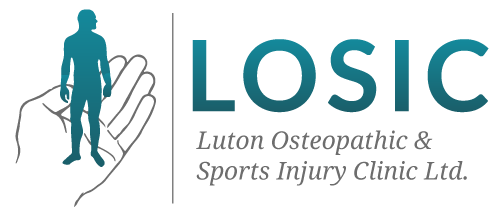Sleep is an essential part of our lives, but how often do we think about the quality of our sleep posture? Many people wake up feeling stiff, achy, or tired, not realising that their sleep posture could be the culprit. At the Luton Osteopathic and Sports Injury Clinic (LOSIC), we often see patients experiencing discomfort caused by poor sleep habits. In this article, we’ll explore why good sleep posture is important, how to improve it, and what changes you can make to ensure better, more restful sleep.
The way you position your body during sleep can have a significant impact on your musculoskeletal system. Poor posture while sleeping can lead to:
- Neck and Shoulder Pain: If your head isn’t properly supported, or if your pillow is too high or too low, you might experience tension in the neck and shoulders, which can result in pain.
- Lower Back Pain: A sagging mattress or poor alignment can cause the spine to curve unnaturally, increasing pressure on the lower back.
- Joint Stiffness: Sleeping in awkward positions can limit movement in the joints, leading to stiffness and discomfort when waking up.
At LOSIC, we often treat patients who unknowingly aggravate their conditions through poor sleep habits. Osteopathy can help by addressing the structural imbalances that arise from improper sleeping positions, while also offering practical advice on maintaining better posture at night.
A common issue we see is patients sleeping in positions that strain their spine and joints. By working with patients to understand their specific needs, we can help them make changes that reduce stress on their musculoskeletal system.
-
Choose the Right Mattress
Your mattress plays a crucial role in supporting your body. A mattress that’s too soft can lead to your spine curving unnaturally, while one that’s too firm might not allow your body’s natural curves to rest comfortably. We recommend a medium-firm mattress that supports the spine in a neutral position, reducing strain on muscles and joints. -
Get a Good Pillow
The right pillow can make all the difference, particularly for neck and shoulder alignment. For back sleepers, a pillow that supports the natural curve of your neck is ideal. If you’re a side sleeper, you might need a slightly thicker pillow to keep your head aligned with your spine. Consider using body pillows for added support, especially if you sleep on your side, as they can help keep your hips aligned. -
Consider Your Sleeping Position
- Back Sleepers: Sleeping on your back is generally considered the best position for spine alignment. Place a small pillow under your knees to relieve pressure on your lower back.
- Side Sleepers: If you sleep on your side, placing a pillow between your knees can help keep your hips aligned and prevent lower back strain.
- Stomach Sleepers: This is the least recommended position, as it places undue stress on the neck and lower back. If you must sleep on your stomach, using a very thin pillow or no pillow at all can reduce the risk of neck strain.
-
Room Environment and Hygiene
A supportive sleep environment is crucial for restful sleep. This includes:- Ventilation: Keeping the room well-ventilated can improve air quality and help regulate body temperature during sleep.
- Lighting: Make sure your room is dark enough to support the body’s natural sleep cycle. Light-blocking curtains can be helpful.
- Temperature: A cooler room, around 16-18°C, is optimal for most people’s sleep.
-
Sleep Hygiene Habits
Simple habits can improve sleep quality:- Keep a consistent sleep schedule.
- Avoid screens an hour before bedtime, as blue light can interfere with melatonin production.
- Engage in relaxation techniques such as light stretching or meditation before bed to ease muscle tension and promote relaxation.
- Neck pain: Often caused by poor pillow choice or awkward head positioning.
- Shoulder pain: If you’re sleeping on your side without proper support, the pressure can affect your shoulder joint.
- Lower back pain: Caused by inadequate mattress support or misaligned posture.
At LOSIC, we can assess your musculoskeletal health and provide personalised recommendations to improve your sleep posture, potentially reducing pain and discomfort. By addressing both sleep habits and any underlying conditions, we aim to help you achieve long-term health and wellbeing.
Good sleep posture is crucial for preventing musculoskeletal issues and ensuring you wake up feeling refreshed. If you or someone you know is struggling with sleep-related discomfort or movement issues, book an appointment with us at LOSIC. Our osteopathic approach can help you improve your posture, reduce pain, and enjoy a better quality of sleep. Reach out to us today—your body will thank you!
- Neck and Shoulder Pain: If your head isn’t properly supported, or if your pillow is too high or too low, you might experience tension in the neck and shoulders, which can result in pain.
- Lower Back Pain: A sagging mattress or poor alignment can cause the spine to curve unnaturally, increasing pressure on the lower back.
- Joint Stiffness: Sleeping in awkward positions can limit movement in the joints, leading to stiffness and discomfort when waking up.
-
Choose the Right Mattress
Your mattress plays a crucial role in supporting your body. A mattress that’s too soft can lead to your spine curving unnaturally, while one that’s too firm might not allow your body’s natural curves to rest comfortably. We recommend a medium-firm mattress that supports the spine in a neutral position, reducing strain on muscles and joints. -
Get a Good Pillow
The right pillow can make all the difference, particularly for neck and shoulder alignment. For back sleepers, a pillow that supports the natural curve of your neck is ideal. If you’re a side sleeper, you might need a slightly thicker pillow to keep your head aligned with your spine. Consider using body pillows for added support, especially if you sleep on your side, as they can help keep your hips aligned. -
Consider Your Sleeping Position
- Back Sleepers: Sleeping on your back is generally considered the best position for spine alignment. Place a small pillow under your knees to relieve pressure on your lower back.
- Side Sleepers: If you sleep on your side, placing a pillow between your knees can help keep your hips aligned and prevent lower back strain.
- Stomach Sleepers: This is the least recommended position, as it places undue stress on the neck and lower back. If you must sleep on your stomach, using a very thin pillow or no pillow at all can reduce the risk of neck strain.
-
Room Environment and Hygiene
A supportive sleep environment is crucial for restful sleep. This includes:- Ventilation: Keeping the room well-ventilated can improve air quality and help regulate body temperature during sleep.
- Lighting: Make sure your room is dark enough to support the body’s natural sleep cycle. Light-blocking curtains can be helpful.
- Temperature: A cooler room, around 16-18°C, is optimal for most people’s sleep.
-
Sleep Hygiene Habits
Simple habits can improve sleep quality:- Keep a consistent sleep schedule.
- Avoid screens an hour before bedtime, as blue light can interfere with melatonin production.
- Engage in relaxation techniques such as light stretching or meditation before bed to ease muscle tension and promote relaxation.
- Neck pain: Often caused by poor pillow choice or awkward head positioning.
- Shoulder pain: If you’re sleeping on your side without proper support, the pressure can affect your shoulder joint.
- Lower back pain: Caused by inadequate mattress support or misaligned posture.
Good sleep posture is crucial for preventing musculoskeletal issues and ensuring you wake up feeling refreshed. If you or someone you know is struggling with sleep-related discomfort or movement issues, book an appointment with us at LOSIC. Our osteopathic approach can help you improve your posture, reduce pain, and enjoy a better quality of sleep. Reach out to us today—your body will thank you!
The Importance of Good Sleep Posture for Health and Wellbeing

